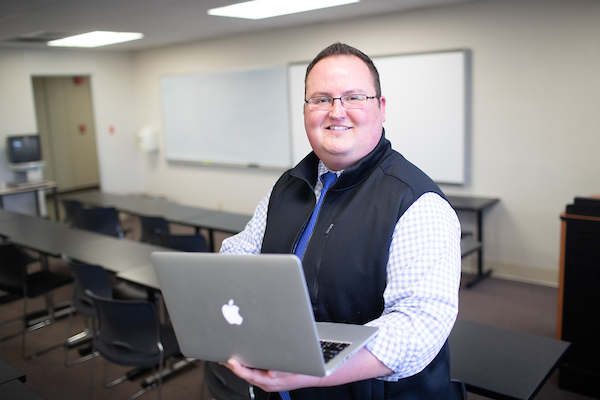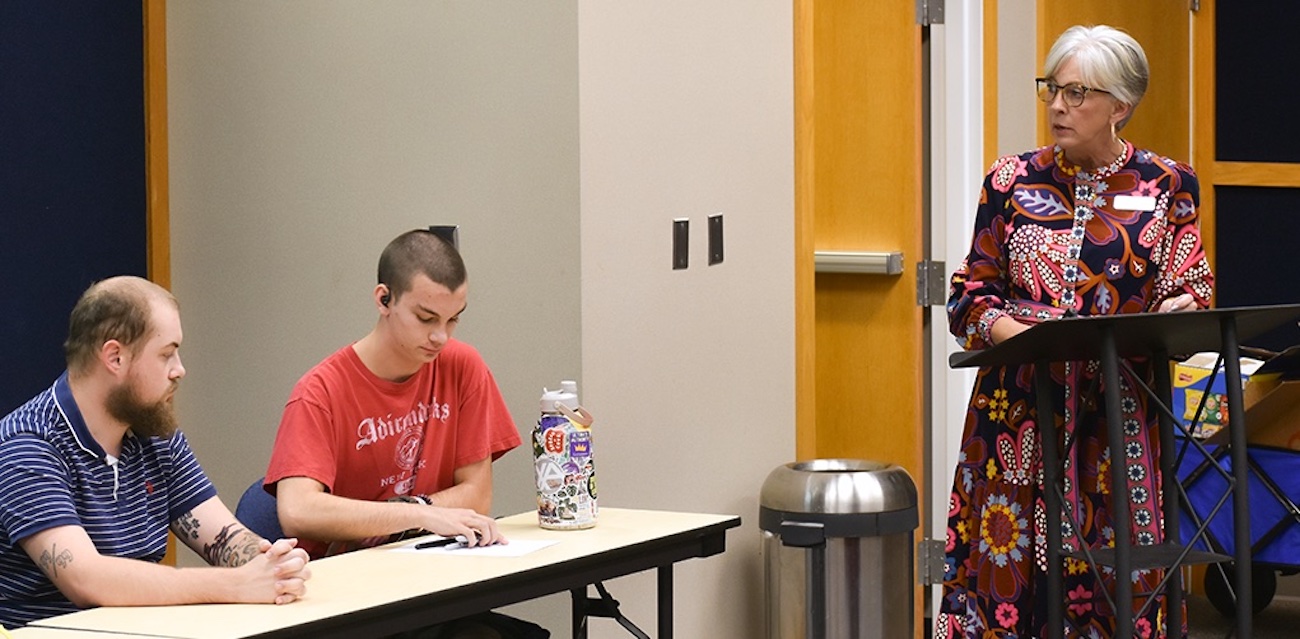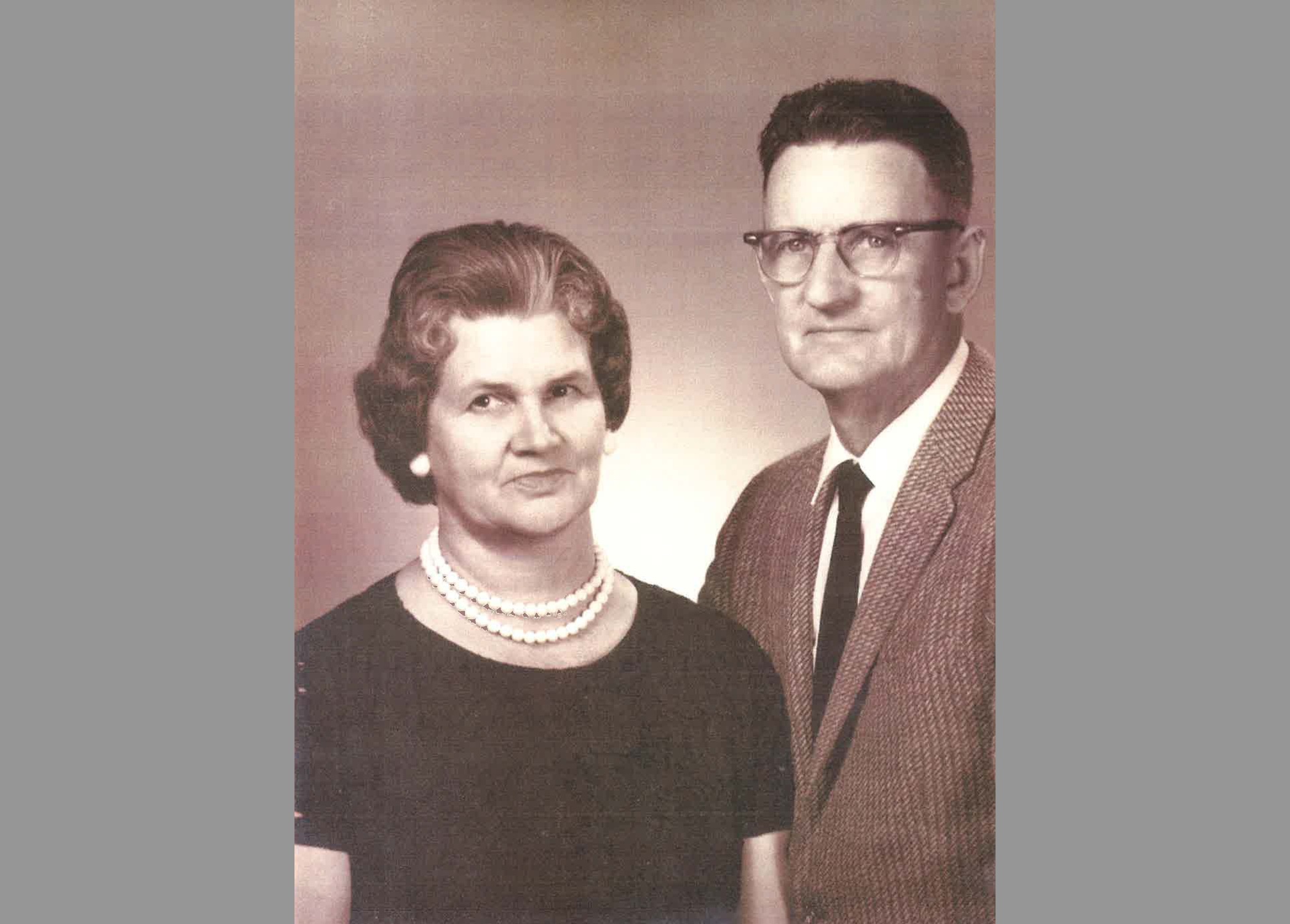APSU’s education doctorate experiences strong first year

CLARKSVILLE, Tenn. – Michael Johnson, a Northwest High School music teacher, can’t stop thinking about leadership strategies. For the last seven or eight months, he’s fixated on the topic, causing him to scrutinize his conversations with students and colleagues.
“A year ago today, I would never have analyzed it as much as I do now,” Johnson said. “The way I view things now is from the lens of ‘What’s the leadership style? Why is this working or not working?’ I’m not in a leadership role yet in the school system, but my thinking has translated into my classroom and my interactions with other teachers.”
Johnson began developing this new mindset back in August when he became one of Austin Peay State University’s first doctoral students. He, along with 19 other educators and working professionals, enrolled in the Eriksson College of Education’s new Doctor of Education (Ed.D.) degree program, with a focus on educational leadership, and with program’s first year coming to an end, he remains committed to one day being called “Dr. Johnson.”
“It’s clear this is not a fly-by-night degree,” he said. “This is very well established, with high expectations, and they’re not going to just hand you a degree. You’re going to have to work for it. That’s exciting. As the first cohort, we get to set the standard for that.”

A hard-working cohort
Dr. Gary Stewart, APSU professor of education, spent the last several years developing the doctoral program because of a growing demand from local educators. Last summer, when the University was finally ready to admit students, Stewart made sure they enrolled only the top candidates.
“They’re everything we thought they would be,” he said. “We knew almost 99 percent of them because they came through either our Ed.S. program in leadership or they came through one of our graduate programs. We knew the caliber of students we were getting.”
On a recent Monday evening, the doctoral students gathered in a small classroom inside the Claxton Building. As they waited for their class to begin, some students yawned while others sipped coffee. They’d spent the day teaching or working other jobs, but instead of going home to eat dinner or relax with their favorite Netflix show, these individuals came to campus to analyze leadership strategies.
“So far, it’s different from everything I did in my other degrees,” Sarah Dugger, a science teacher at Cheatham County Central High School, said. “I know it will definitely be worth it. I want to teach at the college level. Right now, even though I’m just a classroom teacher, I’m able to apply the leadership concepts I’ve learned.”
In the next few weeks, Stewart will begin interviewing candidates for the doctoral program’s second cohort of students. And though the program is almost a year old, people continue to ask him if the rumors about Austin Peay offering an Ed.D. degree are true. He tells them they are.
“I get calls and emails all the time,” Stewart said. “I keep a perspective list over here, and just for the next cohort, I have almost 40 people who’ve expressed an interest.”
These potential students often have different professional goals, but they all want the program to help them grow as leaders. In the current cohort, Dugger plans to use her leadership training to teach at a college or university, while Johnson hopes to become an assistant principal within the Clarksville-Montgomery County School System.
“I have long aspired to have a doctorate and knowing that it was going to be the first doctoral class at Austin Peay was a deciding factor,” he said. “With it being a college that was created for teachers, it seemed like the perfect university to get an educational leadership degree from. It’s continuing a tradition of excellence, of high standards.”
Austin Peay was founded in 1927 as a normal school for the training of rural educators in Tennessee.
The degree

The Ed.D. was designed to meet the needs of several groups of potential students, including:
- Current educational leaders in the K-12 environment who currently hold an administrative license.
- Classroom teachers who have earned master’s or Ed.S. degrees who wish to acquire the administrative license while obtaining a doctorate.
- Classroom teachers who have earned master’s or Ed.S. degrees who do not wish to be a school administrator but desire to become an educational leader.
- Current educational leaders in the K-12 environment who need to earn the doctorate to either enhance their marketability or to improve their skills.
- Military personnel who desire to continue their education after the master’s degree.
The degree, housed within the college’s Department of Educational Specialties, consists of 60 credit hours beyond a master’s degree, with students taking classes in leadership theory and practice, research and statistics, organizational analysis and analysis of educational policy, in addition to writing a dissertation.
For information on the Ed.D. program, visit https://www.apsu.edu/education/programs-of-study/edd.
News Feed
View All News
As a first-generation college student originally from Paso Robles, California, Teen Tennessee Petite winner Rylei Johnson is using her time at Austin Peay State University to maximize her impact through community outreach and education.
Read More
Barnett, an assistant professor in the Department of Educational Specialties and coordinator of the Master of Arts in Education in educational leadership studies, brings a unique combination of academic excellence and real-world leadership experience to the role. Under her leadership, the educational leadership studies program has experienced a 147% growth in enrollment over the past five years.
Read More
To qualify for the scholarship, recipients must be enrolled in the Eriksson College of Education with an elementary focus, maintain full-time enrollment status, have a minimum GPA of 2.75 and demonstrate financial need.
Read More